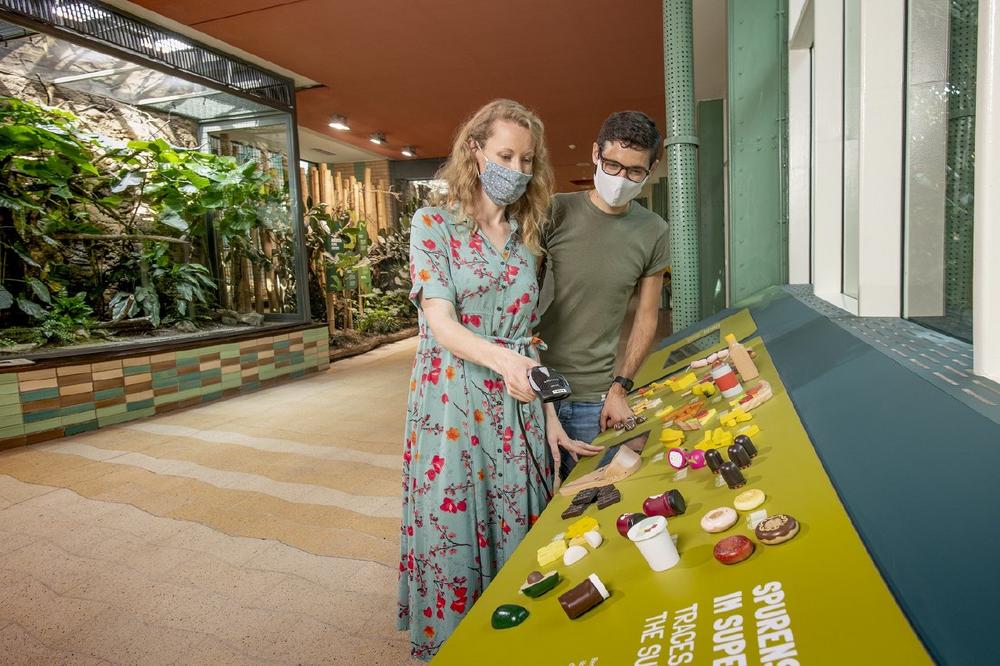This fascinating tropical rainforest is now right here in the German capital. After two years of renovation work, Tierpark Berlin’s venerable Alfred Brehm building reopens to visitors on 17 July 2020 with a brand-new look. “As our new Rainforest House, the renovated Alfred Brehm building whisks guests away to the tropical islands of Southeast Asia,” says Zoo and Tierpark Director Dr Andreas Knieriem. “Many aspects of the historic building, which was the largest animal house in the world when it first opened in 1963, no longer met the demands and requirements of modern animal keeping.” Where previously a large number of different big cats were housed close together in a confined space, the building’s inhabitants now have far more spacious and varied habitats that are designed to resemble their natural homes in the wild. By filling the moats in the two rock halls, ample areas were created for the Tierpark’s Sumatran tigers and Malayan sun bears, which visitors can now view up close thanks to the large panoramic windows. The former bird display cases have been converted into close-to-nature terrariums for reptiles, amphibians and invertebrates. And with plenty of new plants and trees, the walk-through Tropical Hall at the heart of the building truly lives up to its name, providing a varied habitat for flying foxes, crocodiles and exotic birds. The areas outside the Alfred Brehm building have also been given a makeover: Javan and clouded leopards can now climb skywards thanks to suspended net platforms, as can the Goodfellow’s tree kangaroos. These endangered marsupials are new to Tierpark Berlin and their walk-through habitat offers an exciting experience for visitors.
“I am pleased that state funds of around €4.4 million have enabled us to take another important step towards modernising Tierpark Berlin,” says Berlin’s finance minister Dr Matthias Kollatz. “The Tierpark has grown increasingly popular in recent years, and is now gaining greater recognition beyond the borders of Berlin.” Additional generous support for the modernisation of the Alfred Brehm building came from the Lotto Stiftung, which contributed €4 million, and from the Gemeinschaft der Förderer von Zoo und Tierpark Berlin (Society of Zoo and Tierpark Patrons), which provided €750,000 towards the construction of the sun bear enclosure and other parts of the project.
But amid all the excitement, the message of the Rainforest House is a serious one: these tropical paradises – the most species-rich habitats on earth – are under threat all over the world. “The animals here are ambassadors of their kind and remind us humans of the importance of protecting and maintaining their habitat,” says His Excellency Arif Havas Oegroseno, Ambassador of the Republic of Indonesia. “Indonesia has been contributing to the collection of animals at Tierpark Berlin since 1972 through animal exchange and breeding schemes. And I am glad that this year Indonesia has been entrusted by Tierpark Berlin to help redesign the Alfred-Brehm building.” Humans are the main threat to the survival in the wild of the species housed at the Alfred Brehm building. Increasing demand for resources is particularly evident in these biodiversity hotspots: an area of rainforest the size of dozens of football pitches is destroyed every minute. Traces of the disappearing rainforest can be found everywhere in our daily lives – in meat, in paper, and in mobile phones. Rampant consumerism is responsible for the destruction of our planet’s “green lungs”. This issue is brought to life in the building’s central exhibition, #tracesoftherainforest. At six research stations focusing on different areas of everyday life, visitors of all ages can embark on an interactive quest to discover the many ways in which we can all help protect the rainforest. “Raising awareness of species extinction and the role humans play in it is an important task for modern zoos today,” says Berlin’s Economics Senator Ramona Pop, praising the building’s new exhibition. “We are therefore very pleased that our GRW funds are making a valuable contribution to environmental education here.”
Tierpark Berlin is open daily from 9 a.m. to 6.30 p.m., and currently as late as 9 p.m. on Thursdays and Fridays. Face masks must be worn inside all animal houses, including the Alfred Brehm building. In addition, a minimum distance of 1.5 metres must be observed between visitors, and the glass panels and other surfaces should not be touched. Tickets are available online at: https://www.tierpark-berlin.de/de/tickets
Zoologischer Garten Berlin AG
Hardenbergplatz 8
10787 Berlin
Telefon: +49 (30) 25401-0
Telefax: +49 (30) 25401-255
http://www.zoo-berlin.de
Stellv. Leiterin Kommunikation und Marketing
Telefon: +49 (30) 25401-212
Fax: +49 (30) 25401-255
E-Mail: p.hachmeister@zoo-berlin.de
![]()

